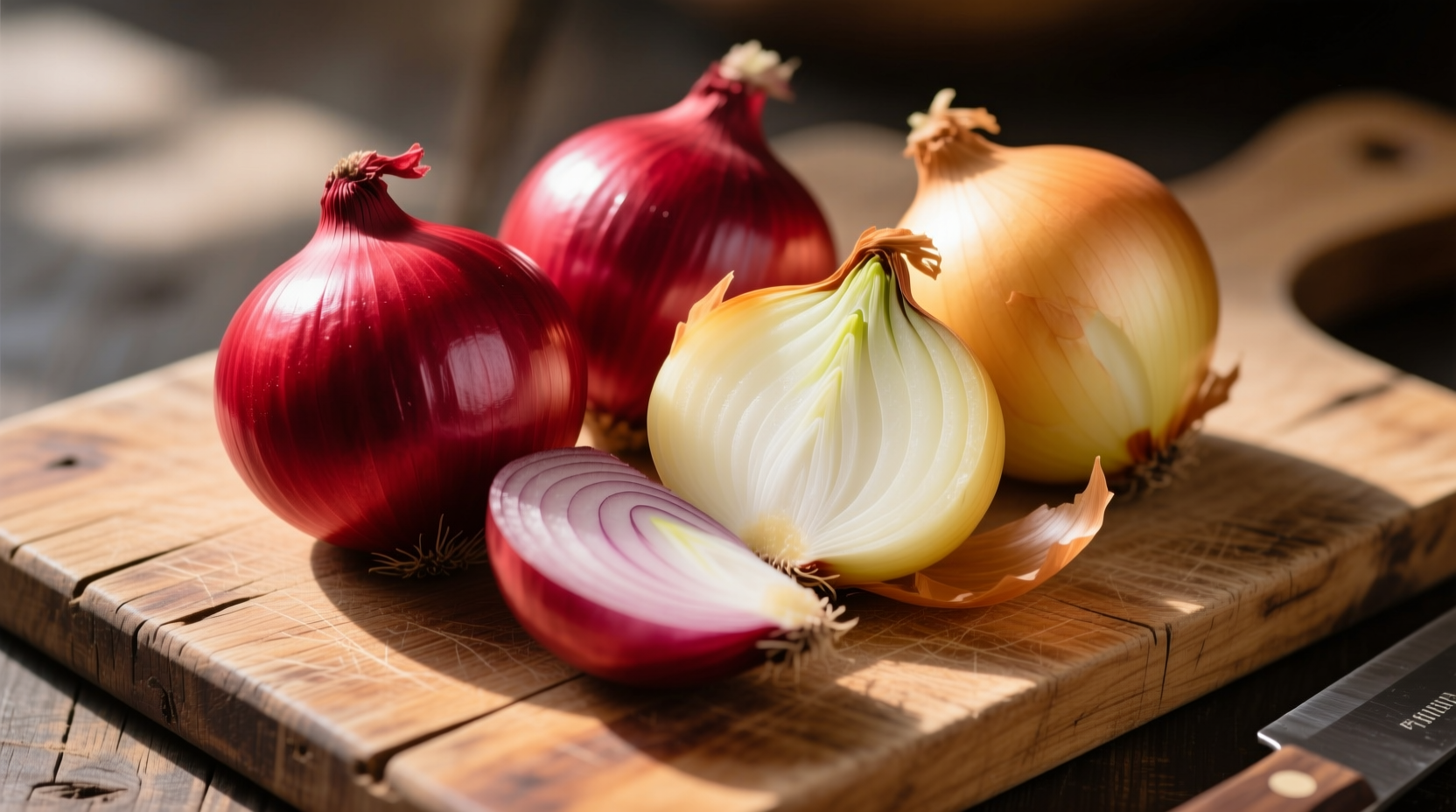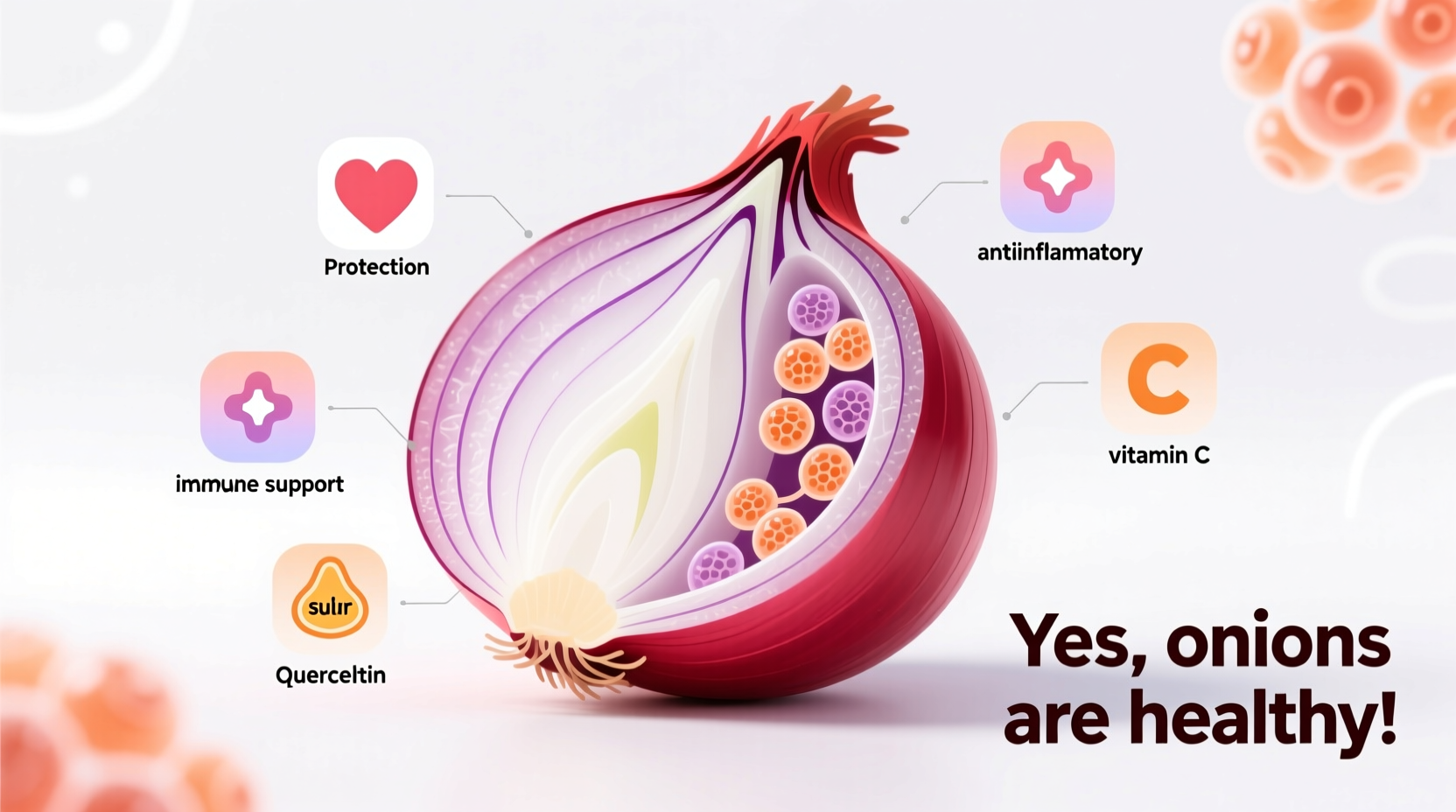When you chop into an onion, you're not just preparing a kitchen staple—you're unlocking a powerhouse of phytonutrients with decades of scientific research backing their health benefits. This humble allium vegetable has been cultivated for over 5,000 years, but modern science continues to reveal why it deserves a permanent place in your diet.
What Makes Onions Nutritionally Unique
Unlike many vegetables that lose nutritional value during cooking, onions actually increase certain beneficial compounds when prepared properly. The secret lies in their unique combination of sulfur-containing compounds and flavonoids that interact with your body's systems in remarkable ways.
| Nutrient | Raw Yellow Onion (100g) | Daily Value % | Key Health Functions |
|---|---|---|---|
| Quercetin | 19.5mg | N/A | Antioxidant, anti-inflammatory |
| Vitamin C | 7.4mg | 8% | Immune support, collagen synthesis |
| Folate | 19μg | 5% | Cellular repair, DNA synthesis |
| Potassium | 146mg | 4% | Blood pressure regulation |
| Dietary Fiber | 2.1g | 7% | Digestive health, satiety |
Data source: USDA FoodData Central
The Science Behind Onion Health Benefits
Research published in Nutrition Reviews demonstrates that onions contain over 25 different flavonoids and sulfur compounds that work synergistically to deliver health benefits. The most significant findings include:
Cardiovascular Protection
A 12-week clinical trial with 54 participants showed that consuming 100g of raw red onions daily significantly reduced both systolic and diastolic blood pressure compared to the control group. The sulfur compounds in onions, particularly allicin, help relax blood vessels and improve circulation. According to research from the American Heart Association, regular onion consumption correlates with a 17-28% reduction in heart disease risk.
Blood Sugar Regulation
Onions contain chromium and quercetin, both shown to improve insulin sensitivity. A study in Nutrition Journal found that type 2 diabetes patients who consumed 100g of red onion daily experienced significant reductions in fasting blood glucose levels after four weeks. The organosulfur compounds in onions appear to stimulate insulin production from pancreatic cells.
Cancer Risk Reduction
Population studies across Europe have consistently shown that higher onion consumption correlates with reduced risk of several cancers. Research published in Cancer Prevention Research indicates that people who consume onions daily have up to 22% lower risk of colorectal cancer and 25% lower risk of stomach cancer compared to those who rarely eat onions. The quercetin and organosulfur compounds appear to inhibit tumor growth and induce cancer cell death.

Maximizing Onion's Health Benefits Through Preparation
How you prepare onions dramatically affects their nutritional profile. Understanding the science behind onion chemistry helps you extract maximum health benefits:
- Chop and wait: After cutting onions, wait 5-10 minutes before cooking to allow alliinase enzymes to convert compounds into beneficial organosulfur compounds
- Raw vs. cooked: Raw onions provide more quercetin, while cooked onions increase certain antioxidant compounds
- Cooking methods: Light sautéing preserves more nutrients than boiling; roasting at moderate temperatures (350°F) enhances antioxidant activity
- Pairing strategy: Combine onions with healthy fats like olive oil to increase absorption of fat-soluble antioxidants
When Onions Might Not Be Beneficial
While onions offer significant health advantages for most people, certain individuals should exercise caution:
- FODMAP sensitivity: Onions contain fructans that can trigger digestive issues in people with IBS (approximately 15% of the population)
- Blood thinning concerns: The quercetin in onions has mild anticoagulant properties; those on blood thinners should maintain consistent consumption levels
- Allergic reactions: Rare but possible, particularly in individuals with latex allergy (latex-fruit syndrome)
- Acid reflux: Raw onions may exacerbate symptoms in people with GERD
According to clinical guidelines from the National Institutes of Health, individuals following a low-FODMAP diet for IBS management should limit onion consumption to 10g portions of green onion tops, which contain significantly fewer fructans.
Practical Ways to Incorporate Onions Daily
You don't need dramatic dietary changes to benefit from onions. Small, consistent additions make the biggest impact:
- Add raw red onion slices to salads and sandwiches for maximum quercetin
- Include caramelized onions in omelets and frittatas for enhanced antioxidant activity
- Blend cooked onions into soups and sauces for added depth and nutrition
- Try fermented onion recipes to increase beneficial bacteria and reduce FODMAP content
- Store onions properly (in a cool, dark place with good air circulation) to maintain nutrient density
For optimal health benefits, aim for ½ to 1 cup of onions daily across meals. Research suggests consistent daily consumption yields better results than occasional large portions.
Onion Varieties and Their Unique Benefits
Different onion varieties offer distinct nutritional profiles. Understanding these differences helps you target specific health goals:
- Red onions: Highest in quercetin and anthocyanins (antioxidants also found in berries)
- Yellow onions: Contain the highest overall antioxidant capacity when cooked
- White onions: Milder flavor with slightly different sulfur compound profile
- Shallots: Highest concentration of flavonoids per serving
- Green onions: Lower in fructans, making them more digestible for sensitive individuals
A comparative study in the Journal of Agricultural and Food Chemistry found that red onions demonstrated 11 times greater antioxidant activity than white onions and twice that of yellow onions when measured using the ORAC (Oxygen Radical Absorbance Capacity) method.











 浙公网安备
33010002000092号
浙公网安备
33010002000092号 浙B2-20120091-4
浙B2-20120091-4